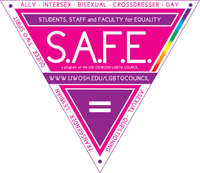
Social Justice Minor
Develop a secondary field of knowledge and expertise that will enable you to critically examine the values that constitute social justice in theory and practice, understand the principles of effective social activism, and formulate and evaluate policies that seek to address issues such as racism, violence, literacy, human rights, gender equity, gender expression, poverty, hunger and conservation of the environment.
Please contact Courtney Bauder to find out more about the Social Justice Minor (bauderc@uwosh.edu). One advising appointment can help you find out more about the minor, the classes, and opportunities to help others. We would be happy to answer any questions you might have.
Contact Us
Sage Hall, Room 3455
835 High Avenue
Oshkosh, WI 54901
Email: bauderc@uwosh.edu
Phone: (920) 424-0964
Student Planning
Find the current class schedule, next semester’s class schedule and the closed class policy. Contact Courtney Bauder to find out more about the Social Justice Minor (bauderc@uwosh.edu).
Minor Requirements
The social justice minor requires 21 credits, including an entry-level classroom experience, a capstone experience and 15 credits of elective course work.
This minor benefits students who seek a career in public service, including government, law, medicine, social work, non-profit organizations, advocacy work, clergy and education, as well as those students who wish to engage in the issues and ideas surrounding social justice and diversity. Students in any major interested in devoting energy to organizations that further the goals of social justice will find this minor a solid foundation for a lifetime of community activism.
Study Abroad
Experience a unique opportunity, travel to a different part of world and develop an understanding for diverse backgrounds.
National Student Exchange
Contact Courtney Bauder for more information. Students will need elective coursework pre-approved before registration and enrollment. Up to two pre-approved courses can be counted for elective credit in the minor.
Report
a bias accident or hate crime

Notice of Nondiscrimination
The University of Wisconsin Oshkosh is committed to nondiscrimination on the basis of race, color, ethnic or national origin, sex, sexual orientation, gender identity, gender expression, religion, age, ancestry, disability, genetic information, pregnancy, martial or parental status, military status, veteran status, arrest or conviction record, or political affiliation.
